Coleman Does It Again, Historic Women's Hurdles, And More Pro Highlights
Coleman Does It Again, Historic Women's Hurdles, And More Pro Highlights
Christian Coleman's world record, Sharika Nelvis' American record and Donavan Brazier 800m win highlighted the professional action from the weekend.
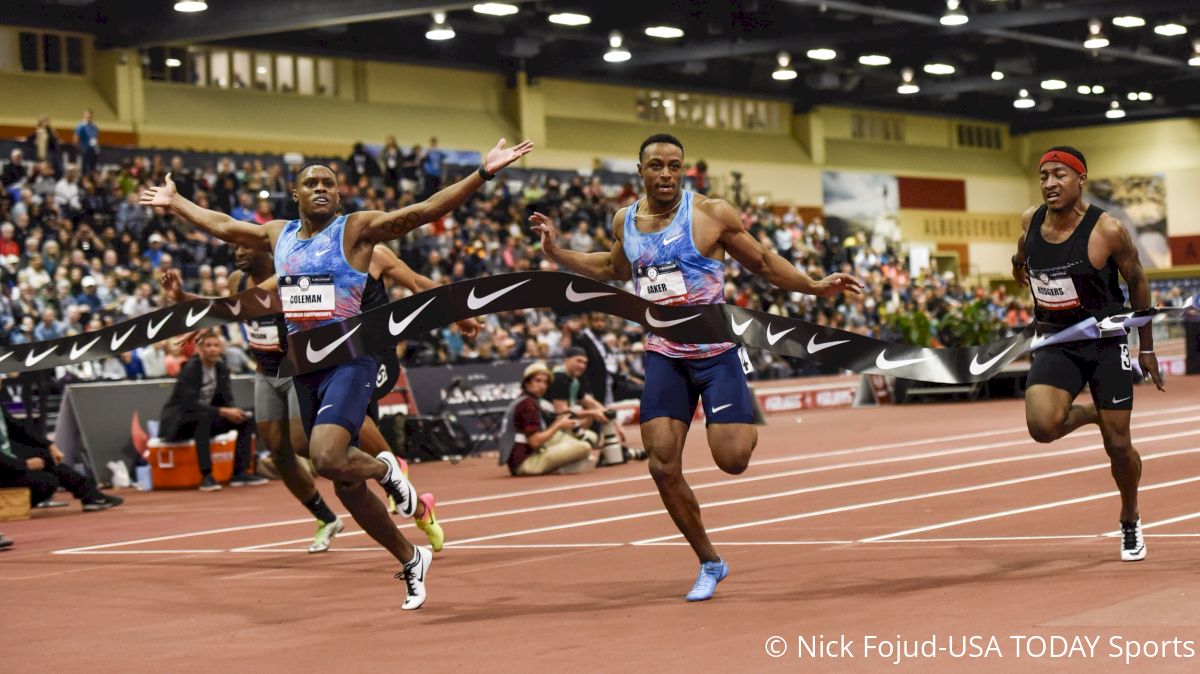
The 2018 U.S. Indoor Championships checked off all the boxes. There were American records, world records, close races for qualification spots, upsets, and unanswered questions heading into the 2018 World Indoor Championships.
Here are few of the storylines heading out of Albuquerque on the way to Birmingham.
World Records, American Records, & Almost Records
Ever since Christian Coleman ran 6.37 in January, the track world wondered whether he could do it again. The curiosity was born out of the common desire to see great feats replicated. But it also came from necessity. Though Coleman’s 6.37 was faster than Maurice Greene’s world record of mark of 6.39, it was not officially ratified because the facility didn’t have on-site drug testing or electronic blocks.
Ever since that night, Coleman had to do it again — for the sake of the clarity of the record book, and because when you open with a 6.37 certainly more is possible. Sunday night he blasted a 6.34 in Albuquerque, shaving 0.05 from his Clemson mark and giving more evidence that Coleman will be the sprinter to beat this year regardless of the distance.
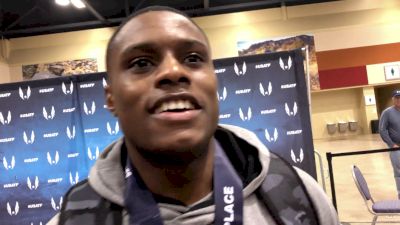
The American team for Birmingham will be strong — incredibly strong. Ronnie Baker ran 6.40 behind Coleman, a mark that would have dropped jaws if not for Coleman’s six seconds of brilliance. Only three men have run 6.40 or faster all-time: Baker, Coleman, and Greene. Two of them are on the U.S. squad for the 2018 World Indoor Championships.
Prior to the men’s 60m, Sharika Nelvis turned in the performance of the meet. Scratch that, the women’s 60m hurdles turned in the performance of the meet. Nelvis was in fast forward on the last two hurdles and set the American record at 7.70. Behind her, Keni Harrison ran 7.72, equalling the American record mark she set last week, and Christian Manning posted a 7.73. That's three top-10 performances of all-time in one race.
Because either Manning or Nelvis will win the 2018 IAAF World Indoor Tour (and receive a bye into the World Indoor Championships) all three women will get to race in Birmingham. With lower elevation, it’s unlikely that we will see faster marks, but who won’t want to see these three women race each other one more time this indoor season. While Harrison has received the most publicity for her struggles in global championships, all three women will be looking for their first global medal in Birmingham.

For the third time in as many weeks, Donavan Brazier flirted with the American indoor record in the 800m. His most recent attempt was his best, running uncontested and clocking a 1:45.10 in Albuquerque. Brazier ran behind Erik Sowinski for the first lap before taking off in front. His finishing time was just 0.1 off the American record. If he has anything left in his legs in two weeks, that mark could go down.
Strong Closes
Other than Brazier posting 1:45s, the other thing you can count on this indoor season in the men’s 800m is that Drew Windle is going to made up huge amounts of ground in the last two laps. Windle sat in last place place at the bell on Sunday, well out of the top two position he’d need to make the World Indoor Championships squad. Then Windle did what Windle does: he closed in 26.23 for the final 200 and made up four spots in the last lap. His finishing time of 1:46.29 put him behind Brazier, but well clear of second place. His splits for each 200m lap were 25.50, 27.60, 26.97 and 26.23.
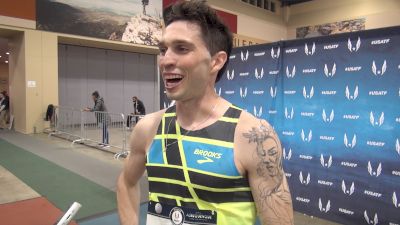
In the women’s 400m Courtney Okolo, made up 0.7 on Shakima Wimbley in the last 200m to take the win. That event was full of drama after Phyllis Francis laid down a tough marker of 51.19 in the first heat. The two-heat final meant that the fastest two would qualify, regardless of their heat. Like Windle, Okolo was dead last at the bell, but she slowed down the least over the final 200 and was able to just edge Wimbley at the line, 51.16 to 51.17. The 51.19 from Francis only ended up being good enough for third place
Surprise Absences
Despite running a person best of 7.49, Devon Allen was the odd man out in 60m hurdles. Allen’s slow start out of the blocks proved to be his undoing — that and Jarret Eaton and Aries Merrit turning in superb performances. Eaton ran a lifetime best of 7.43 to take the win and Merritt went 7.46, just 0.03 off his lifetime best in the event.
Before the meet, I wrote about the gold-medal drought for the American men in the 400m at world indoors. For a variety of reasons, the American men don’t have the same output as they do outdoors where they pile up medals with regularity. Sunday’s result in Albuquerque goes a little way to explaining that phenomenon.
Despite having the fastest time in the prelim by 0.4 seconds, Fred Kerley did not finish in the top two in the finals. Kerley got off to a conservative start and bumped Dontavius Wright as Kerley tried to move into the inside lane 200 meters into the race. The contact broke his momentum and he wasn’t able to recover. The incident underscores how different the indoor 400m is from its outdoor counterpart.
There is no contact and no navigating the break line in the 400m outdoors. The need to get to the inside adds an element of gamesmanship to the race and also forces runners to alter their strategy. The contact between Kerley and Wright changed the race entirely and instead of two runners from the fast heat taking the top spots, Aldrich Bailey was able to finish second from his time in heat one. Michael Cherry won heat two and took the overall win. Now, Bailey and Cherry will look to win the first U.S. gold in the men’s 400m since 2003.
As expected, Kerley received some feedback from his race performance.
Internet Coach don’t slide in my Dm and give me advice about nothing if your haven’t coach a guy under 45 second r 46. You is not my coach and go drink some milk.
— Fred Kerley (@fkerley99) February 19, 2018
Breakouts
Javianne Oliver ran a personal best of 7.11 in the semifinals and then went even faster in the finals, putting up a 7.03. The time is the fastest in the world this year and seemingly came from nowhere for the Kentucky alum. The race was missing some of its expected firepower after Tori Bowie scratched and Dezerea Bryant did not race in the final. But Oliver’s time would have been great regardless of the competition. Can she replicate that performance in two weeks time?
Katie Mackey’s been around for longer than Oliver, but like the sprinter she made her first U.S. team this weekend. Mackey ran a strong and smart 3000m to take second behind Shelby Houlihan. The race for second was in doubt in the final straightaway with Mackey and Coburn going stride-for-stride. Mackey got the final qualification spot and we got this awesome post-race interview.
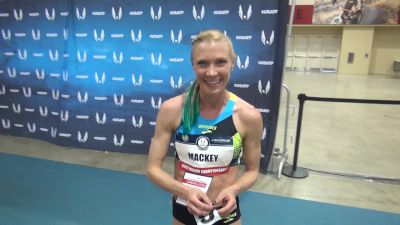
Distance Doubles
Houlihan’s win in the 3000m was just the first half of her weekend. On Sunday, she came back to win the 1500 in 4:13.07, creating a little bit of drama with her late-race close. Houlihan moved from eighth to first on the penultimate lap and then held on for the victory. With wins in the 1500 and 3000 the question once again turned to her Twitter account.
Feel like a handle change is due for Shelbo800. She should pretty much just switch it to Shelbo•any•race•you wanna•challenge•me•to with that kinda range. https://t.co/qsre8A7x2O
— Larra Overton (@LarraOverton) February 18, 2018
Paul Chelimo’s 1500/3000 victories were a bit less dramatic than Houlihan’s. Chelimo and his teammate Shadrack Kipchirchir worked together to control the front of the pack during the men’s 3000m.
When it came time to kick, only Ryan Hill was a threat to break into the top two. Chelimo took the victory in 7:57.88 and Kipchirchir escaped from Hill to grab the other qualifying spot.
The next day, the strategy looked to be the same with Chelimo, Kipchirchir and Emmanuel Bor (another teammate of Chelmio and Kipchirchir) taking turns at the front. Things got a bit bunched up and a tad more complicated than the 3000m, but Chelimo was unfazed taking the win in 3:42.91. Ben Blankenship and Craig Engels got past Kipchirchir for second and third. Despite not finishing in the top two, the development of Kipchirchir’s speed continues to be one of the most important developments of the 2018 indoor season.
The moment you realize you trespassing...I’m guilty @benfblankenship ??♂️ pic.twitter.com/JGJho0Qa98
— Paul Chelimo???? (@Paulchelimo) February 19, 2018
Third Placers Going To Worlds
It was supposed to be the first two across the line, but some third-place finishers will be racing in Birmingham. Chelimo’s desire to only race the 3000m at the 2018 World Indoor Championships means that his spot in the 1500 will go to Craig Engels. This is Engels’ first national team after finishing fourth, fourth, and fifth in his last three attempts.
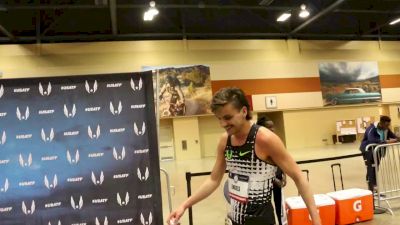
Third placer Jeneva Stevens will also likely go to Worlds in the shot put as second placer Erin Farmer does not have the world standard.